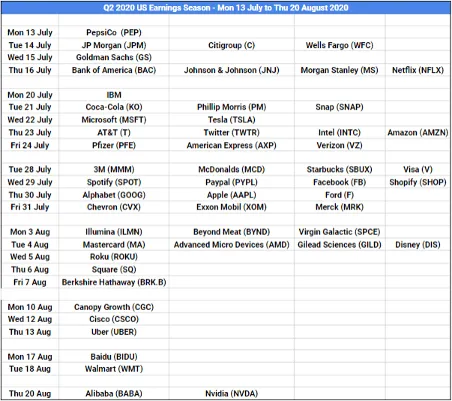There’s no precedent for this US earnings season. Everyone is watching closely over the next 60 days as a slew of multinational giants, tech behemoths and oil supermajors report earnings, zeroing in on hints that corporate profits could recover as coronavirus lockdowns ease.
investors are still chewing over the spread of the virus and the degree to which the huge monetary and fiscal stimulus by central banks has successfully stemmed the bleeding for uncertain economies.
JP Morgan (NYSE:JPM), Citigroup (NYSE:C) and Wells Fargo (NYSE:WFC) will start us off on Tuesday 14 July. Data from London financial markets staple Refinitiv suggests that this season will be a near-record-breaking lossmaker for the banks up first.
Q1 2020 US bank earnings were no pretty picture. Goldman saw its profits fall 46%, while JP Morgan took a painful 60% earnings loss. On the retail side, Citigroup and Bank of America (NYSE:BAC) fared even worse.
So that’s why the world has a laser focus on Q2 2020 US earnings season.
Between now and 20 August the world’s most popular companies from Tesla (NASDAQ:TSLA) to Microsoft (NASDAQ:MSFT), and Netflix (NASDAQ:NFLX) to Snap (NYSE:SNAP), will expose the end result of a quarter of unprecedented supply and demand destruction.

Back and forth
It’s been a whipsaw few months for investors. Volatile doesn’t really cover it.
We have witnessed everything from negative oil prices in April to the Covid-specific pharma boom.
And yet all the while analysts still tell us that hope springs eternal.
“Ongoing grim US infection news continues to be summarily ignored in favour of ongoing optimism regarding the timeline for the discovery and rapid roll-out of an effective vaccine and/or more policy support for asset prices and the US economy,” NAB head of FX strategy Ray Attrill told Reuters.
Bank stocks actually rose on Friday 10 July. JP Morgan climbed 5.4% and Citigroup jumped 6% on a glimmer of positive potential Covid treatment news from Gilead Sciences (NASDAQ:GILD), which said its experimental drug remdesivir reduced the risk of mortality in severely ill virus patients by 62%. No matter that history tells us that a vaccine is years away.
Few investment managers betting on a swift recovery will tell you that the fastest vaccine ever developed was for mumps in 1948, and that took four years.
Still, with bond yields so low it’s perhaps no surprise that private investors keep pumping every spare scrap of cash on hand back into equities.
After a strong and forceful recovery in April and May, June has been quieter, with markets mostly trading sideways.
And while all other indicators have been misleading or just inadequate, the VIX volatility index is perhaps our best shot at understanding where markets might go next. Following a general downward trend since the all-time-highs of 82.16 on 16 March, the VIX ticked higher on Monday 13 July from 29 to 32. This level is still way above historic averages of 12.
First up
The first US earnings to arrive on Monday 13 July were Pepsico (NASDAQ:PEP). The snack food and fizzy drinks distributors reported better-than-expected earnings of $1.32 per share compared to expectations of $1.25 per share. Revenue fell 3.1% to $15.95 billion but was still some margin ahead of expectations of $15.37 billion. Millions more workers grazing on unhealthy snack foods at home under lockdown was a bonus for Pepsico, even as soda sales fell flat.
Pepsico in particular is a favourite of risk-shy asset managers. For example the UK’s Evenlode has Pepsico as its first US equity pick in its Income Fund, among UK FTSE 100 defensive dividend stars like GlaxoSmithKline and Unilever.
If the banks can follow Pepsico it would offer some indication that a swift V-shaped recovery and bounceback to late-February highs is possible. That’s certainly not in the predictions. Analysts are expecting the second-worst quarter for bank earnings since the late 1960s.
But, we’ve been surprised before. Most FTSE 100 and S&P 500 earnings guidance remains sketchy for the rest of 2020, so I wouldn’t bet the farm on a second stock market crash.
